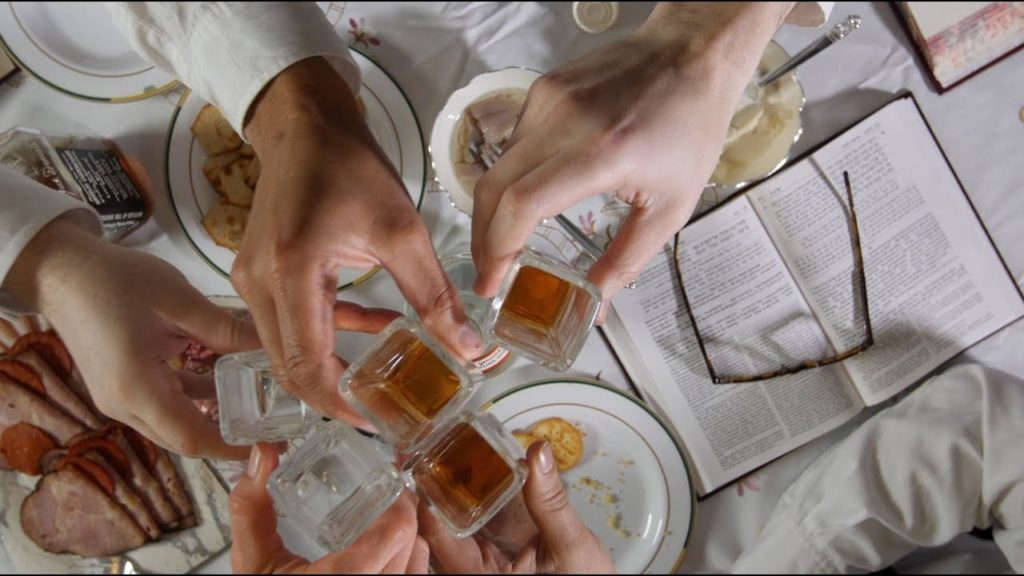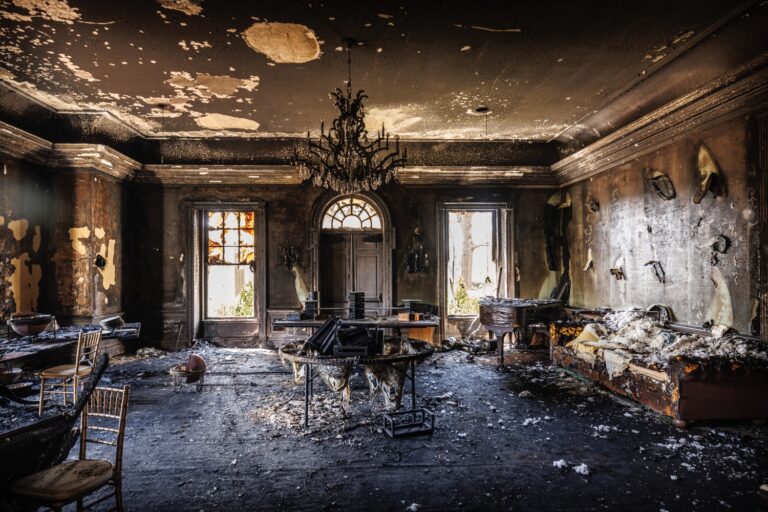(By Rabbi Yair Hoffman for 5tjt.com)
There was someone who had walked out of the sanctuary of the shul to where the other men were making kiddush. This time, however, someone began to berate him:
“You don’t come here to daven! You come here to drink and to talk!”
This vignette would normally be unremarkable, except for the fact that the person doing the berating was the shul’s Hispanic custodian. The story is not apocryphal – it genuinely happened.
What we are concerned about, however, is not the berating per se, but rather the halacha behind walking out in the first place.
The man was walking into the shul’s unofficial “Kiddush Club.”
A Kiddush Club is when people walk out of shul before the Rabbi’s speech or before the haftorah – in order to make kiddush on wine or schnapps and socialize.
The proliferation of Kiddush clubs is so great that there was article about it in Newsweek during the summer of 2004. There is even a Wikipedia entry on the subject. After a definition the article notes:
“The practice was criticized by the Orthodox Union (OU) in December 2004, when the OU called for the elimination of such practices. OU Executive Vice President Rabbi Dr. Tzvi Hersh Weinreb criticized “Kiddush Clubs” for detracting from the honor of the synagogue, promoting gossip (lashon hara), and leading participants to return to services in a state of intoxication (which are violations of Jewish Law), reducing decorum, and enabling the problem of substance abuse.”
Aside from the five points Rabbi Weinreb mentions – there is the sixth issue of Kavod HaTorah – the honor of Torah itself – namely – the Rabbi who is giving his drasha.
KAVOD HATORAH
Although we know that there is nothing greater than the study of Torah, we find something fascinating in Meseches Megillah (3b). There it states that kavod haTorah – honoring Torah is greater than limud haTorah – the study of Torah. If a Talmid Chochom dies on Purim we eulogize him even if it will mean that we will be unable to hear the Megillah!
The Derech Chaim on Pirkei Avos 6:3 demonstrates clearly that Kavod HaTorah is greater than the honor that must be given kings.
Rav Ovadiah Yoseph zt”l notes that in our generation (Yechaveh Daas VI #49), Kavod haTorah has already fallen ten flights down.
The Rosh explains in Nedarim 22b that even after the Beis HaMikdash was destroyed women continued to go up to Yerushalayim on the three regalim in order to hear Torah. Even though they are exempt from Torah study they went up because of Kavod haTorah.
The Gemorah is filled with illustrations of people who did not exit during a Torah discourse to use the facilities and suffered medical repercussions based on this. The reason that they did not leave was because of Kavod HaTorah.
In recent years, many shuls have reacted in different ways to kiddush clubs. Some have tried banning them altogether. This has had mixed results. Since many of the participants are from the more powerful members of the congregation, the Rabbis have had a hard time eliminating them.
WHAT THE WIVES SAY
One woman interviewed for this article asked: What message does the kiddush club send to their own children, the Rav and the community? The drasha of the Rav could a great source of inspiration for the husbands. If they miss that one opportunity – where else will they get chizuk?”
Another woman said: “I worked so hard to get my son to shul. When he arrived – the seat was empty. Where was his father? At the Kiddush club!”
HISTORY OF THE KIDDUSH CLUB
As far as the history of Kiddush Clubs – it is not so new. A responsa Sefer called Yefeh Nof (rbought to this author’s attention on the Seforim Blog) that was written by Rav Moshe Yitzhak M’zia (1530-1600) states as follows:
About the custom of the bachurim on Shabbos to leave the synagogue after the Torah is removed from the ark to drink whisky before mussaf, is this permitted?
Rav M’zia answers:
If they do not sit down for a meal this is permitted because the law does not follow Rav Huna who prohibits tasting prior to mussaf.
At the time, however, Rabbonim did not give drashos – so only Rabbi Weinreb’s first five points apply.
The author can be reached at [email protected]
(YWN World Headquarters – NYC)












18 Responses
If someone would enter the shul in a clearly immodest state, there would be an outcry. If someone found a swastika spray painted on the outside of the shul, there would be an outcry. I f someone vandalized the shul, stole from the pushka, etc., there would be an outcry. These are all violations of the kedusha and integrity of the Beis Haknesses.
I am not a Rov. But I would not hesitate to anger my largest donors and patrons if banning the Kiddush Club would upset them. It is no more proper to desecrate the shul with the above examples than to walk away to engage in imbibing alcohol. If that is more important to a shul member than the davening and the decorum, let alone the midos of a Yid that preclude drinking for pleasure, then let him seek membership elsewhere. If I make my Beis Hamedrash into the makom tefilo that is a source of pride to HKB”H, I am sure that He will arrange for the financial stability without the treif money.
Maybe don’t shush people out of Shul or have a fast davening followed by kiddush.
Anyone who walks out of shul to join in a kiddish club, or even to learn from a sefer in shul, while the Rav is giving his drosha, is a Ro’tzeiach.
Many of the types that partake of the “Kiddush Clubs” look like they belong more in an Irish Bar, than a shul.
I have witnessed them come back to the regular after davening kiddush drunk and even insulting visitors. Such as the time two of them berated a visitor eating cholent, when ones says to the other one: “I wish these people wouldn’t come here and eat our food!” The second one bellowed out with a loud “AMEN!”
This is not Yiddishkeit.
There is a sefer written around the year 1600 called Yosef Ometz written by the dayan of frankfurt, rav Yosef Yutzpa with a variety of short pesakim. One decried kiddush clubs and talked of participants struggling to return to shul given their inebriated state. he said he was inclined to forbid sellers of wine and other intoxicating beverages to sell to young people who exit the shul during the Haftorah. I believe the Shelah haKodosh was the rav at the time, but my memory is hazy.
the sefer has an incredible collection of items of interest with a number of practices of ancient provenance.
I guess we could be Melamed Zchus by saying, Even when they are drinking and shmoozing they still find a little time to Daven. Nebach:(
A number of years back I joined a shul, and was specifically asked if I wanted to join the Kiddush Club, as they tack on an extra fee! I loved the Shul and the Rov, but I found that appalling,
Dryidd,
The kohanim duchan during shachris on Simchas Torah for this reason
Rav Hoffman’s analysis fails to note the risks to the tzibur resulting from the likley incidences of DWI. among Kiddush Club participants.
Have the members of the kiddush club form their own minyan. They won’t walk out of their own minyan to drink. There wouldn’t be a minyan left. Worked in my shul with two minyanim on Shabbat morning, and no more Kiddush Club.
DWI on Shabbos?
I think that the Drasha should come after Shul. People have a hard enough time sitting for davening and the speech invites the kidush club. Davening in a place that attracts these kind of people should not take longer than an 1:45.
GH,
DWI? On Shabbos?
Unless you meant , Davening While Intoxicated.
to Rav Hoffman,
I enjoy your comments but here I believe there are two issues, not one.
1) walking out from the rabbi’s sermon. Is it permitted?
2) kiddush ‘clubs’, should they be tolerated, and especially before mussaf?
My opinion, and I am not a rabbi, is that it is better to walk out before the rabbi’s speech if you don’t care for him or it, walking out in the middle is disrespectful but if it is too long and you can’t stand sitting for so long so make like you are going to the toilet and quietly leave.
regarding kiddush ‘clubs’ drinking to excess is disgusting and should be frowned upon, however to daven on an empty stomach and think about eating while davening is also not good, therefore if a small snack-like kiddush will alieviate hunger and allow the person to daven with more kavana, it is good to eat and drink a bit.
There should be no speeches during davening. As an adult I don’t want to hear it and for the children that won’t sit and there’s no rational way to get them to stay in for a speech. These speeches are slowly putting and end to davening as we knew it.
“Kiddush club” is a shande. At my old minyan, I’ve seen the “club members” start filing out as soon as the first oleh is called to the Torah. They don’t come back until after the drash. Krias HaTorah and haftorah too boring, I guess. Disrespectful to the Torah, to the Rabbi, and an embarrassment to the tzibbur and to their own families, and a bad example for children. The only positive part of Kiddush Club is the talking that would happen anyway takes place outside the shul, instead of inside during krias Hatorah which is distraction and even more offensive, in my mind. Don’t these men get enough drinking and socializing opportunities the other 6 days every week?
Some people are hungry by that time. I know that by mussaf, I’m usually hungry and I find it hard to concentrate on davening, at that point. Some people need a little break in middle of davening.